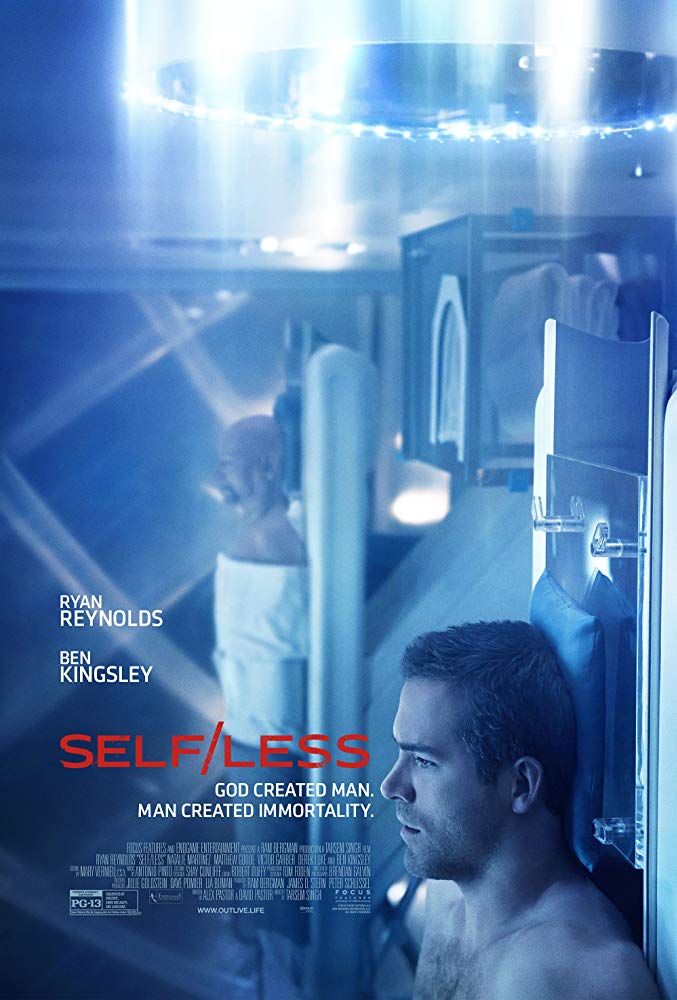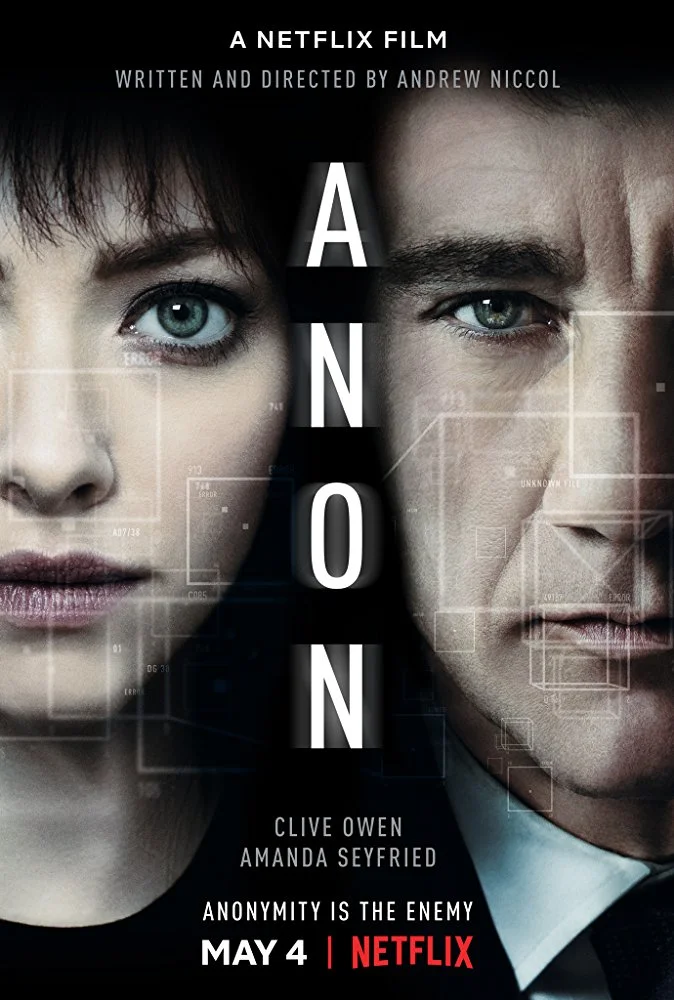Self/Less (2015)
There are some actors out there who do such a good job of fulfilling a specific genre or character type that when they try to fit a different role, it’s jarring.
Ryan Reynolds happens to be one of them.
His trademark acting style is his sarcastic wit and deadpan delivery, a tempo that is so thoroughly ingrained in his best roles that I wonder if the script has to be written specifically for him or if the writers simply put “Reynolds improv here” as his dialog.
That is to say: Reynolds was a poor choice for a straight-shooter. I’m so used to his decade of quippy snark roles that watching him be serious felt wrong.
But enough about Reynolds, lets talk about the movie.
“Self/Less” (2015) used the sci-fi trope “what if you could put an old person’s brain in a young person’s body?”
You’ve probably seen this concept in the classic “Twilight Zone” episode “The Trade-Ins” (1962), or maybe you are unfortunate enough to have read Robert Heinlein’s incredibly creepy fetish novel “I Will Fear No Evil” (1970).
Damian Hale (Ben Kingsley) was on a high-speed train to Stage 4 Cancer Town when he got a fortuitous message from the mysterious “Phoenix Group,” who offered him a chance at a new life, complete with a young, disease-free body grown ethically in a vat of organic, vegan, GMO-free goo.
This program was not FDA approved and thus had to be kept under many wraps, utilizing an empty warehouse and a pop-up medical facility for reasons unknown; for the prices they charged for new youth, there’s no reason that this group didn’t operate from a private island in the Caribbean with the wealthy 1% customers getting flown in.
As I’m sure you’ve figured out by now, the body wasn’t actually a new being, but instead was someone in a medical coma waiting for their brain to get overwritten by a magically modified MRI machine. Damian had to take pills to force his new body (Ryan Reynolds) to accept his brain waves, much like a transplant recipient does to prevent organ rejection.
Turns out the pills weren’t to simply force cranial acceptance: because the body belonged to someone who was distinctly not-dead, the pills helped suppress the original owner until the hostile takeover could thoroughly sink in.
Here’s where the movie started to fall apart:
Damian’s body originally belonged to Michael, a U.S. service member who “disappeared” while on a deployment to Afghanistan. The script never said that he died, simply that he never returned. Which, I guess to a grieving wife, is pretty much the same thing, but semantically very different.
Apparently Michael agreed to let the Phoenix Group take him for these nefarious purposes as a trade off: they got his body, his daughter got the cancer treatments she needs and all the medical bills paid for.
First hiccup: if Michael was in the military, then he and his family had TriCare. While military members like to bitch and moan about the quality of military medical services, TriCare is easily one of the most comprehensive health insurance programs in America. If his daughter had cancer, TriCare would have covered it and he wouldn’t have needed to trade himself away for six figures of medical coverage.
Before old-body Damien went in for his procedure, the doctor in charge - Dr. Albright (Matthew Goode) - told him to settle all of his accounts, as new-body Damien would have to start a whole new life from scratch.
I could buy that: for an illegal medical experiment, you wouldn’t exactly want Steve Jobs to suddenly appear back at Apple HQ in a 25-year-old body to keep running the show - that would raise some very awkward questions.
But that lead to the second hiccup: in the third act, the doctor commented how glorious it would have been if Steve Jobs had another few decades to continue his creative genius. That would, obviously, require it to be public knowledge that body-transplants were possible.
You can’t have it both ways, Dr. Albright!
This could have been a “lets get this clearly illegal process straightened out and back into ‘legal’ territory first before we go public” discussion, but that’s too much reading between the lines, mid-movie, for something that was never even slightly discussed.
Final hiccup: Some of the transitions didn’t really make sense. There were a few times when characters would make a decision, or move from point A to B, or change topics of conversation, without a logical flow. They weren’t massive leaps, but just enough that they caught my attention and stood out.
As a weird side note: I counted that there were four different progress montages. Usually movies have one, maybe two. Three, if they’re really trying to troll the audience in some way. Four is a weirdly high number for a movie that wasn’t also about four separate bank heists.
Now, I’ve complained about a few things, but this movie actually got some stuff right that really stood out:
There are too many movies where some rando picks up a gun and aims it, and whoever they’re aiming at just gives up because they were at the business end. In this one, a civilian actually shot a gun! They aimed, made a threat, and followed through with the shot!
This easily got a “happy ending” label, and everyone got their just rewards. Even Damien got solid closure in his second body that he couldn’t get during his first life.
I don’t think I’ve ever seen such a smooth, flawless implementation of Chekhov’s Gun. It was based around a throw-away comment early in the movie, had a huge ramification in the third act, and absolutely wasn’t shoved down our throats or regurgitated in any way. Color me impressed!
Multiple scenes had a brass/percussion soundtrack that was shown to be an actual band playing music somewhere, and the music just followed new-body Damien around.
No particular special effects to speak of, though much of the scenery was watching Reynold’s forehead crease in concern as new-body Damien tried to figure out what was going on.
As a generalized side note: I’m getting tired of the trope that some movies use where one guy has some piece of technology (hardware or software) that’s magnitudes above and beyond what the rest of that world is using. I get it, there are super geniuses out there, but the first iPhone was just a superior refinement of the technology of the era, not some magical laser-powered mind-reading AI. I don’t get how directors/script writers are okay with the premise that somehow one person can master something that takes groups of people years to figure out.
I think “Iron Man” (2008) got this trend into vogue, and it’s annoying to watch over and over and over again.
Overall, this was positively okay. It got some stuff wrong, but got some other stuff really right - seriously, that Chekhov’s Gun bit blew my mind.
As an action movie, it was almost there.
As a Ryan Reynolds flick, it sits somewhere just under “The Hitman’s Bodyguard” (2017), but above “Green Lantern” (2011).
I streamed it from Netflix, so you can enjoy it from there too.



